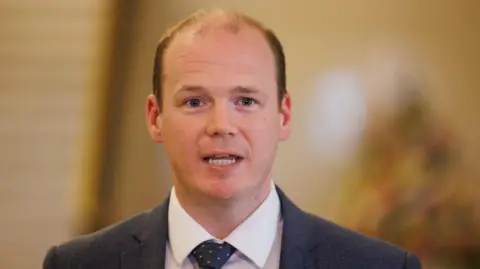The growing concern surrounding winter fuel payment scams targeting vulnerable pensioners has emerged as a significant issue. Communities Minister Gordon Lyons, a key figure in Northern Ireland’s assembly, alerted the public that scammers are already commencing their deceitful operations, preying on the fears and hopes of older adults who are waiting for their long-awaited winter fuel payments to be reinstated. This warning follows a recent announcement that the government has restored these payments, which had previously been suspended, leaving many pensioners uncertain about their financial support during the winter months.
Describing the scams as “disgraceful,” Minister Lyons emphasized the unscrupulousness of these fraudsters who seek to exploit pensioners almost immediately after the government confirmed the resumption of payments. These scams typically involve deceitful communications where pensioners are asked to provide their banking details under the pretense of processing their payments. In a time when many older individuals rely heavily on the winter fuel payment to manage their heating costs, such scams pose an additional burden and emotional distress.
In light of these scams, Minister Lyons reassured potential recipients of winter fuel payments that these funds will be disbursed automatically, negating the need for anyone to provide personal details or fill out any application forms. This clarification aims to alleviate fears and confusion among the elderly population, ensuring they understand that they are not required to engage in any kind of correspondence that might compromise their financial security.
The minister further elaborated on how the payments would be processed, ensuring that pensioners in Northern Ireland would receive their funds concurrently with their counterparts in the rest of the United Kingdom. Under the new legislation, payments are expected to commence prior to the winter season, certainly mitigating the financial strain many felt during prior uncertain winters. The anticipated payments are projected to be up to £300 for households with members over 80 years old, and £200 for those under that age threshold, with eligibility limited to pensioners who earn £35,000 or less.
It is vital to note that these winter fuel payments were originally established in 1997 to assist individuals above the state pension age in managing winter heating costs. Twists to the scheme in recent years have seen the Chancellor, Rachel Reeves, announcing that winter 2024 would mark the first year in which pensioners in England and Wales would not receive these payments, compelling Northern Ireland to follow suit. Consequently, amid changes and restrictions to the eligibility criteria, payments have been largely limited to those living on benefits or pension credit.
The arrival of scammers during this pivotal season represents not only a financial crime but also an emotional scarring for many older adults, who may already be facing numerous challenges, including health concerns, isolation, and financial uncertainty. By continuing to share information and raise awareness around these scams, authorities aim to fortify the defenses of vulnerable pensioners against the unscrupulous tactics employed by fraudsters.
As winter approaches, ensuring that accurate information reaches the intended audience will be paramount. Therefore, sharing best practices on how to identify potential scams and who to consult when needing assistance can empower the elderly. Community outreach programs that educate seniors about their rights and available resources may also play a significant role in combating this worrying trend. In conclusion, the importance of safeguarding our pensioners from fraudulent activities during vulnerable times cannot be overstated, and proactive communication strategies must remain at the forefront of these efforts.



